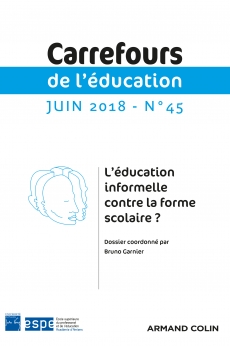
Carrefours de l'éducation n°45 (1/2018)
Pour acheter ce numéro, contactez-nous
Recevez les numéros de l'année en cours et accédez à l'intégralité des articles en ligne.
Le xixe siècle, grâce à la promulgation de lois scolaires, permet une organisation de la fonction enseignante sur le territoire français. Cette fonction était préalablement représentée par une diversité de situations locales, majoritairement peu favorables à la condition enseignante. Or, à Briançon, cette situation apparaît plus enviable : en effet, les instituteurs possèdent déjà un statut suite à l’instauration dans leur région en 1343 d’un régime politique particulier, la République des Escartons. En analysant le statut des instituteurs de Briançon – notamment sur la base d’un fonds d’archives scolaires communal en partie non exploité – l’article décrit les caractéristiques et l’évolution de ces instituteurs tant sur un large empan historique qu’au regard de la situation d’autres instituteurs français. Les résultats de cette étude mettent en évidence les conditions favorables dans lesquelles évoluent les instituteurs briançonnais et montrent qu’une certaine spécificité perdure bien après la Révolution. Cette situation privilégiée est donc le fruit d’un héritage historique mais aussi d’une politique locale qui a toujours promu le savoir comme une des conditions de sa liberté.
In the 19th century, the promulgation of school laws enabled the organisation of the role of teaching and teachers on the entirety of the French territory. This role had until then been characterised by the variety of its local situations, usually not very favourable to teachers. However, in Briançon, the status of teachers did seem rather more to be envied : there, primary school teachers already had a specific status, linked to the establishment in their region in 1343 of a specific political regime, the Escartons Republic. By analysing the status of Briançon’s primary school teachers – in particular through a public school archive which had hitherto not been totally exploited – the paper describes the characteristics and the evolution of these teachers both from a broad historical perspective and in comparison with the situation of other French primary school teachers. The results show the favourable conditions specific to the teachers of the region and their duration long after the French revolution. This privileged situation is thus the result of history but also of local politics, which have always promulgated knowledge as a condition for regional freedom.